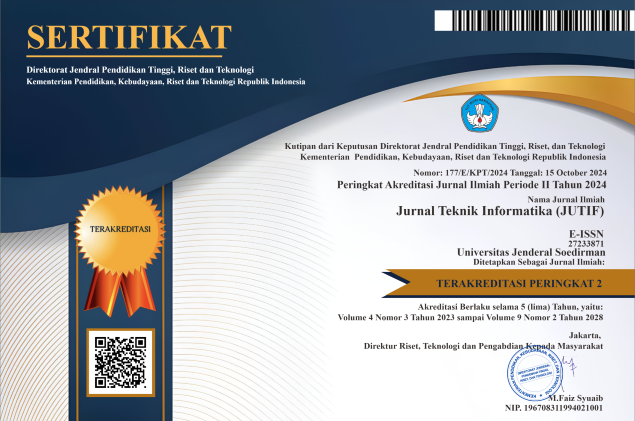MAPPING OF COVID-19 VACCINATION RECIPIENTS IN SUKOHARJO REGENCY BASED ON WEBGIS
DOI:
https://doi.org/10.20884/1.jutif.2022.3.6.633Keywords:
covid 19 vaccination, Mapping, Web-based GISAbstract
Corona Virus Disease 19 (Covid-19) is an infectious disease caused by the acute respiratory syndrome coronavirus 2 (SARS-CoV-2). One of the efforts of the World Health Organization (WHO) in breaking the chain of the spread of Covid-19 is to implement health protocols and implement the Covid-19 vaccine program. Indonesia is one of the countries that implements the Covid-19 vaccination program in order to break the chain of the spread of Covid-19. Based on data from the Ministry of Health of the Republic of Indonesia on November 23, 2021, a total of 135,716,042 vaccinations were recorded for dose 1 and 90,520,201 for dose 2. To assist medical officers in determining vaccination targets and providing information to the public, a system that provides an overview is needed. mapping of vaccination recipients in the Sukoharjo area. In this study, a website-based mapping system was designed using webGIS, the data processed were data on the location and number of vaccine recipients based on age groups in the Sukoharjo Regency area. In designing the system using the Unifield Modeling language (UML) method to describe the design of the system being built. This application is made using the PHP and MySql programming languages to manage the database. Testing is done using the blackbox method by testing the features of the resulting application. The result of this study is a WebGIS-based map of the distribution of the COVID-19 vaccination which contains information on the number of vaccination recipients per sub-district in the Sukoharjo Regency area.
Downloads
References
PDPI, PERKI, PAPDI, PERDATIN, and IDAI, Pedoman tatalaksana COVID-19 Edisi 3 Desember 2020. 2020. [Online]. Available: https://www.papdi.or.id/download/983-pedoman-tatalaksana-covid-19-edisi-3-desember-2020
S. A. Nugroho and I. N. Hidayat, “Efektivitas Dan Keamanan Vaksin Covid-19 : Studi Refrensi,” J. Keperawatan Prof., vol. 9, no. 2, pp. 61–107, 2021, doi: 10.33650/jkp.v9i2.2767.
K. RI, ITAGI, WHO, and UNICEF, “Survei Penerimaan Vaksin COVID-19 di Indonesia,” Satuan Gugus Tugas Penanganan COVID-19, no. November, pp. 1–26, 2020.
K. RI, “No Title,” p. https://vaksin.kemkes.go.id/#/vaccines, 2021.
A. E. Puteri, E. Yuliarti, N. P. Maharani, A. A. Fauzia, Y. Sandy, and N. Tresiana, “Analysis of the Implementation of the Covid-19 Vaccination Policy in Indonesia,” J. Ilmu Adm., vol. 19, no. 1, pp. 122–130, 2022, [Online]. Available: http://jia.stialanbandung.ac.id/index.php/jia/article/view/863
D. Ramadhan et al., “DESIGN OF A GEOGRAPHIC INFORMATION SYSTEM ( GIS ) TO DETERMINE HOUSING LOCATIONS IN ASAHAN,” J. Tek. Inform., vol. 3, no. 3, pp. 527–532, 2022, doi: https://doi.org/10.20884/1.jutif.2022.3.3.195.
M. Mujiyo, S. Sumani, and J. Winarno, “Aplikasi Sistem Informasi Geografi (Gis) untuk Pemetaan dan Simulasi Erosi Tanah,” Caraka Tani: Journal of Sustainable Agriculture, vol. 22, no. 1. p. 60, 2018. doi: 10.20961/carakatani.v22i1.20544.
P. Webgis, U. Pemetaan, P. Spbu, and D. I. K. Semarang, “Jurnal Geodesi Undip Agustus 2015 Jurnal Geodesi Undip Agustus 2015,” vol. 4, pp. 19–25, 2015.
G. Wiro Sasmito, “Penerapan Metode Waterfall Pada Desain Sistem Informasi Geografis Industri Kabupaten Tegal,” J. Inform. Pengemb. IT, vol. 2, no. 1, pp. 6–12, 2017.
F.- Sonata, “Pemanfaatan UML (Unified Modeling Language) Dalam Perancangan Sistem Informasi E-Commerce Jenis Customer-To-Customer,” J. Komunika J. Komunikasi, Media dan Inform., vol. 8, no. 1, p. 22, 2019, doi: 10.31504/komunika.v8i1.1832.
I. C. Utomo, S. Rokhmah, M. Muqorobin, and I. Muslihah, “Web Based Distribution of Zakat, Infaq, and shodaqoh (Case Study Of Surakarta City Region),” Int. J. Comput. Inf. Syst., vol. 1, no. 1, pp. 16–21, 2020, doi: 10.29040/ijcis.v1i1.4.
F. C. Ningrum, D. Suherman, S. Aryanti, H. A. Prasetya, and A. Saifudin, “Pengujian Black Box pada Aplikasi Sistem Seleksi Sales Terbaik Menggunakan Teknik Equivalence Partitions,” J. Inform. Univ. Pamulang, vol. 4, no. 4, p. 125, 2019, doi: 10.32493/informatika.v4i4.3782.
N. A. Putri and W. Waljiyanto, “Analisis Sistem Informasi Geografis (SIG) untuk Penentuan Lokasi Homestay Wisata (Studi Kasus: Desa Sendang, Kecamatan Wonogiri, Kabupaten Wonogiri),” JGISE J. Geospatial Inf. Sci. Eng., vol. 3, no. 2, p. 113, 2020, doi: 10.22146/jgise.58806.
A. J. P. Sibarani, “Analisis Sistem Informasi Rumah Sakit Menggunakan Metode Information Economics,” J. Inform., vol. 8, no. 2, p. 102102, 2014, [Online]. Available: http://www.journal.uad.ac.id/index.php/JIFO/article/view/2056
Suendri, “Implementasi Diagram UML (Unified Modelling Language) Pada Perancangan Sistem Informasi Remunerasi Dosen Dengan Database Oracle (Studi Kasus: UIN Sumatera Utara Medan),” J. Ilmu Komput. dan Inform., vol. 3, no. 1, pp. 1–9, 2018, [Online]. Available: http://jurnal.uinsu.ac.id/index.php/algoritma/article/download/3148/1871
H. N. Putra, “Implementasi Diagram UML (Unified Modelling Language) dalam Perancangan Aplikasi Data Pasien Rawat Inap pada Puskesmas Lubuk Buaya,” Sink. J. dan Penelit. Tek. Inform., vol. 2, no. 2, pp. 67–77, 2018, [Online]. Available: https://jurnal.polgan.ac.id/index.php/sinkron/article/view/130



























